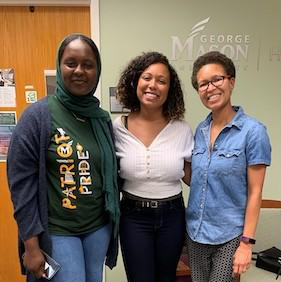The number of Black women entering the foreign service and STEM PhD programs is low. A GAO report said just 3% percent of State Department workers were Black women in 2018, and the National Center for Education Statistics reported that just 10.9% of doctoral degrees awarded in the 2018-19 went to Black women.
But current George Mason University student Soraya Ngarnim and alumna Chanel Grice were determined to overcome those barriers.
With the guidance of LaNitra Berger, senior director of Mason’s Office of Fellowships, and thanks to a happenstance meeting between them, Ngarnim and Grice are fulfilling their dreams and helping promote the ideals of International Black Women’s History Month, which celebrates the achievements and rich histories of the past present and futures of Black women.
Berger said she takes seriously responsibility of guiding Black female students, and that networks for Black women are powerful and oftentimes underestimated.
“I think what’s important for the larger community to see is that young Black women at Mason are doing hard work, getting things done and being successful,” Berger said. “And the university is better for it.”
Grice was a sophomore at Mason in 2014, majoring in global affairs. The daughter of a military officer, she had already lived in multiple countries and wanted to study in Japan. But Grice struggled to find financial assistance. A fellow student suggested she speak with Berger, who introduced Grice to the Boren and Rangel scholarships.
“Dr. Berger gave me books, magazines and other items to help me enrich my studies while showing me how I could follow my vision without the financial capabilities,” said Grice, who earned a Boren scholarship in 2015 and a Rangel fellowship in 2018.
After graduating from Mason in 2017 in bachelor’s degrees in global affairs and economics, Grice earned her master’s in international economics and development from Johns Hopkins University. In June she heads to Ho Chi Minh City in Vietnam for her first two-year appointment with the U.S. Foreign Service.
It was in 2017, while working as an intern at the U.S. embassy in Dakar, Senegal, that Grice met Ngarnim, who also worked at the embassy and was transferring to Mason from Howard Community College. Ngarnim, who will graduate from Mason in May with a biochemistry degree, grew up in Chad, where she was a top student but was shut out of advanced math and physics classes because, as she said she was told, the classes were “too hard” for females.
“That weighed on me, so I pushed and was the only female in those classes in my last year of secondary school,” Ngarnim said. “I know what I can do.”
Ngarmin’s determination prompted Grice to recommend she contact Berger at Mason. Ngarnim said her weekly conversations with Berger helped grow her confidence and realize graduate school is her next step.
“We Black women are more than competent to do any of these positions, and the more advice I have given, the more determined I have become,” Grice said. “I am not lacking. I am in a field where I am underrepresented, but I am confident, and I am here for a reason.”
Ngarnim feels the same as she heads for Rochester, New York, where she has a full scholarship to pursue a PhD in biochemistry at the University of Rochester. Being part of a group that is underrepresented in STEM fields only emboldens her, she said.
“I have always looked for challenges,” Ngarnim said. “I’ve learned that the further you get in your education and career, you have to expect the diversity to narrow. So by getting out of my comfort zone I can pave the way for others.”

